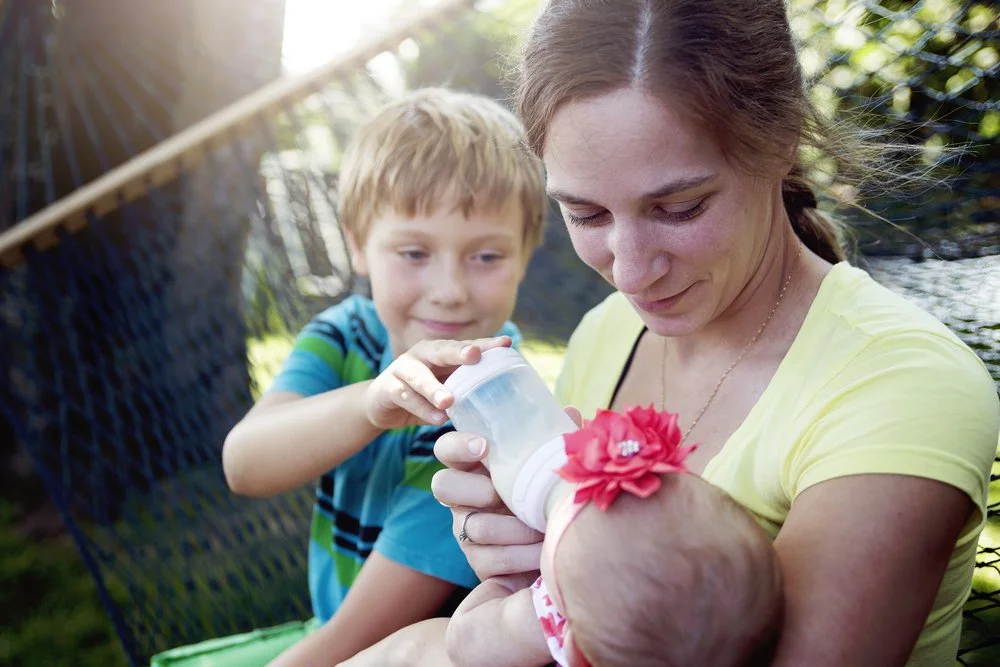The Difference Between the Baby Blues and Postpartum Depression
How to know when it's time to reach out for help
Most moms – nearly 80 percent – will experience the emotional roller coaster known as the 'baby blues' after giving birth. That's because the levels of the hormones that helped sustain a healthy pregnancy drop precipitously – and immediately – following delivery. Hormones and emotions are closely connected, so these hormonal upheavals can cause rapidly changing moods, weepiness, and a general feeling of being overwhelmed.
Factor in the sleep deprivation and the massive life transition of becoming a parent (or adding a child to your family), and it makes perfect sense that the early days with a new baby can feel very, very hard – even overwhelming at times. The good news is that the baby blues go away as your body adjusts and you get used to your new role.
But it's natural to wonder if what you are feeling may be a symptom of something more serious. And considering 20 percent of women do experience postpartum depression or anxiety, it's also important to know when to seek professional help to feel better.
Here are some basic guidelines to assess whether you are feeling (or your loved one is experiencing) the baby blues or the beginning of postpartum depression or anxiety.
How postpartum depression differs from the baby blues
"Some of the emotions of baby blues can overlap with postpartum depression," says Seleni advisory board member Karen Kleiman, MSW, LCSW, founder and director of the Postpartum Stress Center in Rosemont, Pennsylvania. "For example, all new mothers cry. But if you cry all day, for many days, and are unable to function because you are crying too much, that's different. It's not what you are feeling, necessarily. It's how often you feel it, how long you have been feeling this way, and how much it impedes your functioning."
The most important factor to consider is how long you have been feeling this way. "The fundamental differentiation between the blues and postpartum depression is the timing," says Kleiman. "If symptoms of distress emerge after (or last longer than) two to three weeks after delivery, it is no longer considered to be baby blues." It's also important to know that some of the most common symptoms of postpartum depression – persistent anxiety and rage, for instance – don't resemble the stereotype of a lethargic, sadness-filled depression.
What you are feeling may be PPD if you have one or more of these symptoms:
• Are weepy and feel a sense of being overwhelmed for longer than three weeks after delivery
• Are unable to function
• Feel your symptoms are unbearable
• Are unable to sleep, even though you are exhausted
• Want to sleep all the time
• Are sleeping more than usual
• Cry continuously
• Can't enjoy your baby at all
• Don't want to spend time with your baby
• Feel afraid of your baby
• Have a dramatic change in appetite
• Are troubled by anxious thoughts about your baby being harmed
• Feel intense rage
• Have a personal or family history of depression or anxiety
• Withdraw from activities you normally enjoy
• Feel that you have "gone away" or lost yourself
• Think about harming yourself
• Believe your family would be better off without you or that you never should have become a mother
The importance of reaching out for help
"Motherhood is a huge transition," says Katherine Stone, founder and CEO of Postpartum Progress, a national nonprofit focused on raising awareness of perinatal mood and anxiety disorders. "You're learning about your brand-new child and yourself and how you want to parent and be a mom. So there is upheaval no matter what."
But Stone cautions that it can be hard for women to recognize when they have an illness that requires treatment and encourages women to err on the side of getting checked out. "Even if you are not convinced that what you are feeling is PPD and think you can handle it on your own, just talk to your doctor," advises Stone. Even if you learn you do not have PPD, Stone says she "would much rather moms ask for help because we need to learn to ask for help anyway."
"Any time you are worried about the way you are feeling or thinking," emphasizes Kleiman, "it is time to let someone you trust know how you feel."
There is no shame in reaching out for help. Postpartum depression is common and very treatable. Left untreated, postpartum depression can turn into chronic depression that is much harder to treat. But with appropriate treatment and support, you will quickly realize you are not alone. You'll eventually find that you can feel so much better and begin to enjoy life with your new family. "There is so much pain we could all avoid," advises Stone, "if we reach out sooner and realize that we don't have to white knuckle through this."
Here are tips on how to talk to your doctor about PPD.











